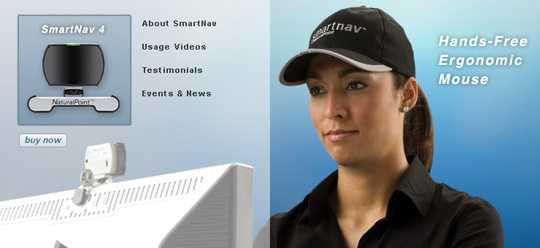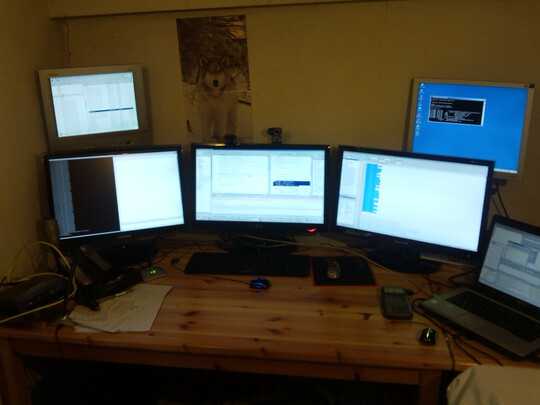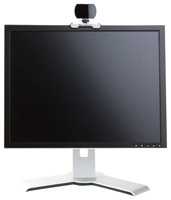1
This isn't the same question as this one, but what is the best mouse for RSI?
What sorts of alterative pointers have people used that weren't awkward, clumsy, or overly expensive?
1
This isn't the same question as this one, but what is the best mouse for RSI?
What sorts of alterative pointers have people used that weren't awkward, clumsy, or overly expensive?
2
If you're worried about RSI, a trackball is definitely the way to go. They're a little difficult to get used to, but you'll notice a difference really quickly.
I <3 my trackball. – TheTXI – 2009-07-16T18:39:56.133
2
I switch my mouse between my left and right hand daily. It was a bit awkward using my off hand at first but after a few hours I was almost at my usual speed.
You can also switch between different mouse sizes/forms. – Franck Dernoncourt – 2012-06-11T13:57:42.897
1
A great mouse alternative I use (I'm a computer scientist): http://www.naturalpoint.com/smartnav/

Works great even with "big" setup such as mine:

How SmartNAV works: http://www.naturalpoint.com/smartnav/products/about.html
SmartNav uses an infrared (IR) camera to track your head movements. Learn more about the technology. You reflect IR light back to the SmartNav, which sends instructions to your computer to move your mouse cursor.
HOW DOES THE TECHNOLOGY WORK? Infrared light is emitted from the LEDs and is reflected back to the imager by a corner cube reflector (3M safety material). This reflected light is imaged by a CMOS sensor and the video signal is passed to the preprocessing electronics. The video signal is thresholded against a reference level and all passing data is sent to the USB microcontroller to send to the PC for object tracking. In order to increase the signal to noise ratio an IR filter that passes only 800nm and above is placed between the imager lens and the outside world. The SmartNav can image any IR source; typically this is reflective material or an active IR source such as an LED. A user may track many different objects by placing reflective dots or LEDs on the object. The SmartNav has a 45 degree field of view and anything being tracked must stay in that field of view.
HOW IS MY HEAD MOVEMENT TRACKED? SmartNav tracks reflections from a tiny dot, which you can place anywhere.
Place our paper thin tiny reflective dot on the part of your body you'd like to control the cursor with. Preferred options include: Head Hand Hat Glasses Mic Boom You can also make your own reflective marker with NaturalPoint's high-quality tracking material available on our Accessories page.

WHERE DO I PUT THE SMARTNAV? SmartNav mounts on top of your monitor, laptop or communication device facing you. SmartNav can also be threaded onto a mini tripod and sit next to your computer. The device can be placed anywhere as long as it can see the reflective accessory you've chosen to wear.
HOW MUCH DO I MOVE? Less than an inch of head movement is more than enough to move the cursor across your entire screen. This is also adjustable in the software SPEED settings. SmartNav has a 45 degree Field of View (FOV), and usually sits about 2 feet away from your head. Thus you have almost two feet of free "head space" in which to move that simple inch.
HOW DO I CLICK? SmartNav offers multiple clicking options. Hotkeys: Re-map keys from your keyboard and assign them to emulate the Left, Right and Middle mouse buttons. Dwell-Clicking Software: Click by hovering the cursor in one spot for a small (and adjustable) amount of time. A full dwell-clicking system and on-screen keyboard are included in the AT software package, allowing for total hands free operation. Ability Switches: Industry standard input switch support allows you to plug two click switches into SmartNav for more clicking options. Choose from our full selection of hand and foot switches on our Accessories page.
I wrote an article about it exploring other solutions. http://francky.me/doc/mouse2012.pdf
http://francky.me/publications.php#mouse2012 :
Abstract—In a few months the computer mouse will be half-a-century-old. It is known to have many drawbacks, the main ones being: loss of productivity due to constant switching between keyboard and mouse, health issues such as RSI, medical impossibility to use the mouse e.g. broken or amputated arm and unnatural human-computer interface like the keyboard. However almost everybody still uses a computer mouse nowadays.
In this short article, we explore computer mouse alternatives. Our research shows that moving the mouse cursor can be done efficiently with the SmartNav device and mouse clicks can be emulated in many complementary ways. We believe that computer users can increase their productivity and their health by using those alternatives.
This article is voluntary short and not overly technical, our main motivation being to make the readers aware of these solutions and their efficiencies. Details can be found in the appendices and by following the URLs and references. The primarily intended readers are computer scientists, people with RSI, physicians and interface pioneers. Feedback is highly welcome: this is work in progress.
How does it work? Motion? Does it need anything fancy to track? – Journeyman Geek – 2012-06-11T14:19:31.943
SmartNav uses an infrared (IR) camera to track head movements. More details in edited answer. – Franck Dernoncourt – 2012-06-11T22:13:13.697
0
I myself haven't come even close to a "alterative pointers have people used that weren't awkward, clumsy, or overly expensive?"
(By the way I cannot see how a pointer could be awkward and clumsy and ergonomics at the same time, it's some sort of an oxymoron.)
But I can recommend you going through this checklist: http://capsoff.org/checklist when considering any solution touted as "ergonomic".
1
This SE proposal might interest you: Hardware Recommendations.
– Franck Dernoncourt – 2014-11-04T22:55:43.833Sounds exciting. Good hardware is expensive but I find usually worth it – bobobobo – 2014-11-07T22:05:44.680